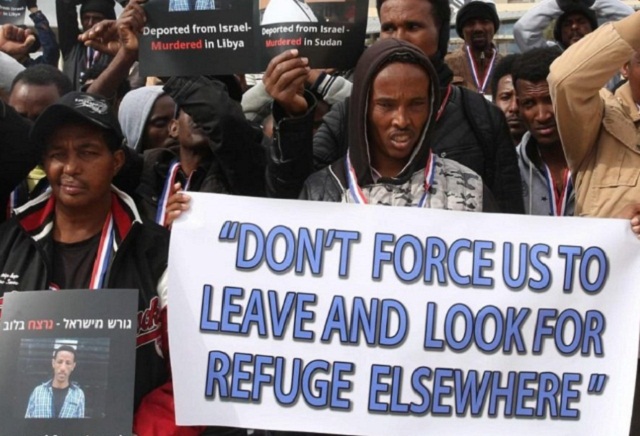
Jerusalem, Undefined | AFP | Israel’s supreme court on Thursday suspended a controversial government plan to deport thousands of Eritrean and Sudanese migrants in response to a challenge from those opposed to the move.
The court said in its decision the state was given until March 26 to provide further information and the suspension on deporting them to a third country would remain in place until then.
Prime Minister Benjamin Netanyahu in January announced implementation of the programme to remove migrants who entered illegally, giving them a choice between leaving voluntarily or facing indefinite imprisonment with eventual forced expulsion.
According to interior ministry figures, there are currently some 42,000 African migrants in Israel, half of them children, women or men with families, who are not facing immediate deportation.
As the migrants could face danger or imprisonment if returned to their homelands, Israel is offering to relocate them to an unnamed African country, which deportees and aid workers say is Rwanda or Uganda.
Migrants began entering Israel through what was then a porous Egyptian border in 2007. The border has since been strengthened, all but ending illegal crossings.
Israel’s deportation or imprisonment plan has drawn criticism from the United Nations refugee agency as well as from some Israelis and rights activists.
– ‘Infiltrators’ –
On Wednesday, Israel closed the Holot detention centre for migrants in the southern Negev desert as part of the deportation plan.
Since Netanyahu announced the deportation plan, some Holot inmates have been transferred to the nearby Saharonim prison.
Others who had submitted asylum requests before January 1 were released pending a decision, Haaretz newspaper reported.
Immigration authority spokeswoman Sabine Haddad said 300 had been freed after agreeing to leave the Jewish state.
Those released were barred from living or working in seven cities with high migrant populations, including Tel Aviv — where most are concentrated — Jerusalem and the Red Sea resort of Eilat, she said.
Holot, an open facility where inmates were free to leave during the day but had to return at night, was opened in 2013 with the aim of siphoning migrants away from the cities, the immigration authority says.
Israeli officials say that no one they classify as a refugee or asylum-seeker will be deported, though the process of granting asylum has been criticised as extremely slow and biased against claims.
Only a handful of asylum claims have been approved in recent years.
The migrants’ presence in Israel has become a political issue.
Religious and conservative politicians have portrayed the presence of Muslim and Christian Africans as a threat to Israel’s Jewish character.
Netanyahu has pledged to “return south Tel Aviv to the citizens of Israel”, adding that the Africans were “not refugees but illegal infiltrators”.
Those opposed to the plan include Holocaust survivors who say the country has a special duty to protect migrants.
 The Independent Uganda: You get the Truth we Pay the Price
The Independent Uganda: You get the Truth we Pay the Price



